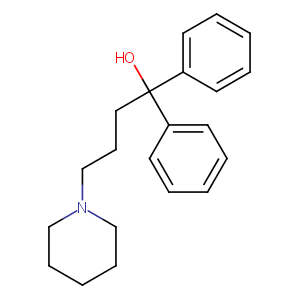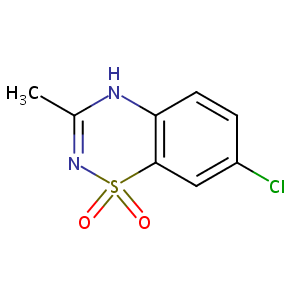| 1 |
Recurrent recessive mutation in deoxyguanosine kinase causes idiopathic noncirrhotic portal hypertension.Hepatology. 2016 Jun;63(6):1977-86. doi: 10.1002/hep.28499. Epub 2016 Mar 31.
|
| 2 |
URL: http://www.guidetopharmacology.org Nucleic Acids Res. 2015 Oct 12. pii: gkv1037. The IUPHAR/BPS Guide to PHARMACOLOGY in 2016: towards curated quantitative interactions between 1300 protein targets and 6000 ligands. (Ligand id: 7163).
|
| 3 |
Diazoxide FDA Label
|
| 4 |
URL: http://www.guidetopharmacology.org Nucleic Acids Res. 2015 Oct 12. pii: gkv1037. The IUPHAR/BPS Guide to PHARMACOLOGY in 2016: towards curated quantitative interactions between 1300 protein targets and 6000 ligands. (Ligand id: 2409).
|
| 5 |
Diphenidol-related diamines as novel muscarinic M4 receptor antagonists. Bioorg Med Chem Lett. 2008 May 1;18(9):2972-6.
|
| 6 |
Drugs@FDA. U.S. Food and Drug Administration. U.S. Department of Health & Human Services.
|
| 7 |
Antihypertensive drugs clonidine, diazoxide, hydralazine and furosemide regulate the production of cytokines by placentas and peripheral blood mononuclear cells in normal pregnancy. J Hypertens. 2006 May;24(5):915-22. doi: 10.1097/01.hjh.0000222762.84605.03.
|
| 8 |
Diazoxide-mediated preconditioning against apoptosis involves activation of cAMP-response element-binding protein (CREB) and NFkappaB. J Biol Chem. 2004 Nov 5;279(45):46748-54. doi: 10.1074/jbc.M406217200. Epub 2004 Aug 23.
|
| 9 |
Diazoxide-mediated growth inhibition in human lung cancer cells via downregulation of beta-catenin-mediated cyclin D1 transcription. Lung. 2009 Jan-Feb;187(1):61-7. doi: 10.1007/s00408-008-9127-1. Epub 2008 Dec 4.
|
| 10 |
Combined contributions of over-secreted glucagon-like peptide 1 and suppressed insulin secretion to hyperglycemia induced by gatifloxacin in rats. Toxicol Appl Pharmacol. 2013 Feb 1;266(3):375-84. doi: 10.1016/j.taap.2012.11.015. Epub 2012 Nov 28.
|
|
|
|
|
|
|


